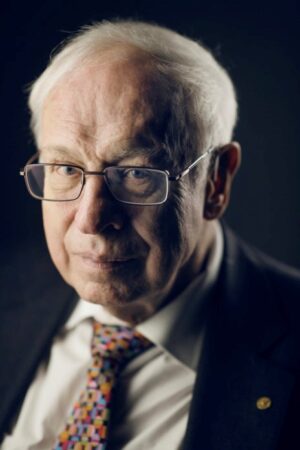
English version follows
Informations de connexion – Conférence et discussion avec Tomas Lindahl
Lien : https://umontreal.zoom.us/s/85637037163?pwd=UHhrRk0zZlp5cUF2MDNaRXNhNGZZUT09
ID du webinaire : 856 3703 7163
Code : 060884
Joindre par téléphone : 1-438-809-7799 / ID : 856 3703 7163
Même lien Zoom pour la conférence et la discussion
Aucune réservation requise
C’est avec grand plaisir que je vous invite à une conférence prononcée par Tomas Lindahl, Prix Nobel de chimie en 2015, intitulée « Mutagenic Causes of Cancer ».
Pr Lindahl a cordialement accepté notre invitation à s’adresser à la communauté de recherche du Québec.
La conférence aura lieu virtuellement, le lundi 29 novembre 2021, à 11h30. Les participant(e)s et étudiant(e)s sont invités à demeurer en ligne après la conférence, pour une rencontre informelle avec le Pr Lindahl débutant à 12h40.
Au plaisir de vous compter parmi nous et n’hésitez pas à diffuser l’information au sein de votre réseau.
Alain Verreault
Chercheur principal, Unité de recherche en biogénèse des chromosomes, IRIC
Professeur titulaire, Département de pathologie et biologie cellulaire, Faculté de médecine, Université de Montréal

Tomas Lindahl
Tomas Lindahl est un scientifique suédois spécialisé dans les dommages et la réparation de l’ADN et a reçu le prix Nobel de chimie en 2015.
Il a obtenu son doctorat et son diplôme de médecine au Karolinska Institutet de Stockholm. Après une formation postdoctorale à l’Université de Princeton et à l’Université Rockefeller aux États-Unis, il a occupé des postes au Karolinska Institutet puis à l’Université de Göteborg, en Suède. Il a rejoint Cancer Research UK au début des années 1980 et est devenu le premier directeur des Clare Hall Laboratories de Cancer Research UK, Hertfordshire, de 1986 à 2005.
Son laboratoire a caractérisé différentes voies de réparation de l’ADN dans le cadre d’un projet à long terme visant à mieux comprendre les mécanismes de défense contre les dommages au génome humain. Ses recherches ont identifié des enzymes de réparation par excision de bases et montré comment elles éliminent et remplacent les parties endommagées de l’ADN. Ces découvertes ont amélioré notre compréhension du fonctionnement de la cellule vivante et des causes du cancer et du vieillissement.
Il a fermé son laboratoire aux Clare Hall Laboratories en 2009, mais demeure un chef de groupe émérite au Francis Crick Institute, Londres, Royaume-Uni.
© Nobel Media AB. Photo: A. Mahmoud
Pour toute question, prière de contacter Nora Mostefaï, Gestionnaire de projet – Affaires scientifiques, IRIC. nora.mostefai@umontreal.ca

Login details – Lecture and Discussion with Dr. Tomas Lindahl
Link: https://umontreal.zoom.us/s/85637037163?pwd=UHhrRk0zZlp5cUF2MDNaRXNhNGZZUT09
Webinar ID: 856 3703 7163
Passcode: 060884
Join webinar by telephone: 1-438-809-7799 / ID: 856 3703 7163
Same Zoom Link for the Lecture and the Discussion
No reservation required
Admission: 500 maximum
Dear all,
It is with great pleasure that I invite you to a lecture given by Dr. Tomas Lindahl, Nobel Prize in Chemistry in 2015, titled « Mutagenic Causes of Cancer « .
Dr. Lindahl has kindly accepted our invitation to speak to the Quebec research community.
The lecture will be held remotely on Monday, November 29th, 2021, at 11:30 am. The participants and students are invited to remain online after the conference for an informal meeting with Dr. Lindahl starting at 12:40 pm.
We look forward to your participation and don’t hesitate to spread the word.
Alain Verreault
Principal Investigator, Chromosome Biogenesis Research Unit, IRIC
Professor, Department of Pathology and Cellular Biology, Faculty of Medicine, Université de Montréal

Dr. Tomas Lindahl
Dr. Tomas Lindahl studied at Karolinska Institutet in Stockholm, where he received his doctorate in 1967. After postdoctoral research at Princeton University in New Jersey and Rockefeller University in New York he became a professor in medical and physiological chemistry at the University of Gothenburg, Sweden. Since 1981 he has worked for Cancer Research UK at Clare Hall Laboratories, Hertfordshire, United Kingdom.
Living cells have DNA molecules that carry an organism’s genes. For the organism to live and develop, its DNA cannot change. DNA molecules are not completely stable, and they can be damaged. From the mid 1970s, through studies of bacteria, Tomas Lindahl showed how certain protein molecules, repair enzymes, remove and replace damaged parts of DNA. These discoveries have increased our understanding of how the living cell works, the causes of cancer and aging processes.
© Nobel Media AB. Photo: A. Mahmoud
For any question, please contact Nora Mostefaï, Project Manager – Scientific Affairs, IRIC. nora.mostefai@umontreal.ca
